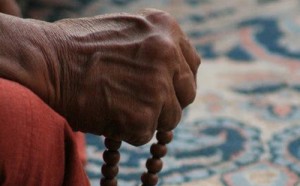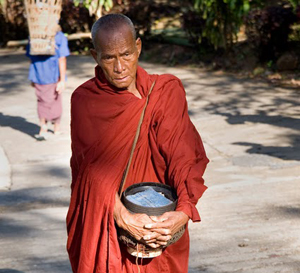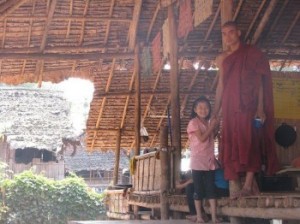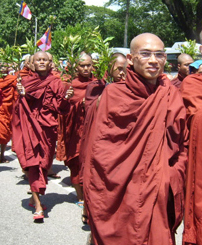Ashin Issariya (aka King Zero): “We need unity. We need to act and work hard.”
By The Best Friend • August 17, 2010 September 27 will be the third anniversary of the brutal crackdown on the peaceful Saffron Revolution in Burma in 2007. Since then many monks have been arrested, forcibly disrobed, and put into jail and forced labor camps. Others have been forced into hiding. Some have fled to Thailand, while others are still hiding inside the country. While their struggle for peace and freedom goes on, the world seems to have forgotten about them. I recently spoke with Ashin Issariya, one of the leaders of the Saffron Revolution, about the current situation of the Burmese monks.
September 27 will be the third anniversary of the brutal crackdown on the peaceful Saffron Revolution in Burma in 2007. Since then many monks have been arrested, forcibly disrobed, and put into jail and forced labor camps. Others have been forced into hiding. Some have fled to Thailand, while others are still hiding inside the country. While their struggle for peace and freedom goes on, the world seems to have forgotten about them. I recently spoke with Ashin Issariya, one of the leaders of the Saffron Revolution, about the current situation of the Burmese monks.
“The situation in Burmese monasteries is increasingly difficult these days. The military tries to control everything. Especially the senior monks are under strict and constant supervision. The regime wants to know exactly which monks are working for democracy, which monks are politically active. The senior monks are obligated to give this information to the regime. This brings them [senior monks] to a very dangerous and difficult situation. Even if they want to support politically active monks, they cannot do so easily.
Some senior monks are also in hiding because of this. Some monks change their color, which means they give up their robes and wear lay peoples’ clothes, in order to stay inside the country. Others have to flee and go to Thailand, India, or Bangladesh. So it is very, very difficult now.
However, many monks are still finding ways to boycott the regime. Many of the monasteries don’t accept offerings from officers of the military regime. Some senior monks are too afraid to decline an offering from the regime because if they do so the monastery can be closed and the senior monks can be sent to jail. Because of this, some monks accept their donations even though they don’t want to.
In years since the Saffron Revolution, around 60 monasteries have been closed in many different parts of the country. The regime has closed certain monasteries and sealed them off. Recently near Shwedagon Pagoda three monasteries were closed. At that time it was the Buddhist Lent period. During this time of the year Buddhist monks are not allowed to travel. So these monks faced a lot of troubles because they had to move to other monasteries.
I am still in close contact with leaders of the monks, political leaders, and also student leaders. We can be in touch through the Internet, phone, and messengers. While moving from one city to another or even walking on the street, monks are checked all the time. Since 2007, every time they go out they are followed by military intelligence agents and asked a lot of questions. This makes it very difficult for a monk to move around. There are different ID cards for monks from different divisions. These ID cards are checked all the time.
Also, inside the monasteries there are informers dressed as monks. The military regime wants to know exactly who is politically active. They are afraid of the monks. They know the monks are able to organize a lot of people to demonstrate again. They know that most people listen to the monks, and that is a great threat to the regime.
But the monks know each other very well. Most have been living together as monks for a long time. In this way they can know if someone is an informer or a real monk. Most informers have been monks for only a short time.
Many monks are still hiding in Burma. I hear about it a lot. Some hide by going from place to place. Some disrobe [giving up the monk hood] even though they do not want to do this. Others, who cannot live in the city anymore, are hiding in the jungle. They build meditation centers in the jungle.
If it becomes too dangerous for a politically active monk to live inside the country because he is constantly followed or someone has found out they are working politically, they have to flee the country. The military regime will try to find out his monastery. They will come to the senior monk and ask a lot of questions. “Is this monk living in this monastery?” The senior monk will usually tell his disciple to move to another place when this happens.
The laypeople know the situation very well and hide monks in their houses and help them to get from one place to another. Laypeople really help the monks a lot.
For Burmese monks who come to Thailand it is very difficult to find a place in a Thai monastery. Most Thai monasteries don’t accept Burmese monks. Many monks have told me about their difficulties. They applied to live in a Thai monastery, but they were rejected. The abbot will give a lot of reasons for this, for example, ‘This monk is not good, it will not be good for other monks if he stays here’. But the true reason is that the Thai monks think they might get problems with Thai or Burmese authorities, and because of this reason they don’t want to accept Burmese monks.
In Thailand it is not allowed for a monk to stay in a lay person’s house. So these monks have to be very careful. They cannot go out in the evening, because they might get followed by the police and get found out that they are not living in a monastery. For this reason they can also not take part in the morning alms rounds to collect food.
In the Mae Sot area we can move freely. But going to Chiang Mai or Bangkok is difficult. For this a passport or some kind of valid ID is needed. Many monks don’t have that because they had to flee fast. If we want to go to Chiang Mai we need to go to an office and apply for permission.
Some monks eventually go back to Burma, but those who cannot go back have to go to a refugee camp if they cannot find a monastery to accept them.
Now everyone sees things in terms of ‘Before the Election’ and ‘After the Election’. Most of the people in our country are very poor. They do not have enough money to buy food. Because of this reason we know there should be demonstrations again, but we don’t know when they will happen. From the Saffron Revolution, we know it is not enough if the leaders are only monks. We need the leadership of the next uprising to be made up of monks, students, and democratic politicians. We are working on creating the situation so that the next demonstrations will be even larger and more effective than 2007.
You are a founding member of the All Burma Monks Alliance. What is the position of the All Burma Monks Alliance towards the upcoming elections?
The All Burma Monks Alliance has never accepted this election because it is based on the 2008 constitution. If you accept the election, you have to accept the constitution. It is not a democratic constitution. Political parties have never had a chance to organize or to speak out freely. The military regime will only change the color of their clothes. They may change their uniform, but it has nothing to do with democracy. They have never gone the democratic way.
For this reason, we monks from the All Burma Monks Alliance have never accepted this election.
Do you, as well as the monks still inside Burma, get support from other monks who are living abroad now?
Only a few monks from abroad are actually working together with us. Maybe when they are so far away they start to forget about our struggles. I have many contacts with monks inside Burma. I try to support them and help in any way with information, money, or whatever they need.
But the monks who are living in America, or other countries, don’t support us. We have no contact. I want to say to them, in this time all monks need to unite. Unity is very important.
I’m in contact with many many people and monks here. As you know I’m living in Mae Sot, and there are many Burmese migrants and refugees here. Monks from Burma can come here easily.
How do you think should the Burmese people act now?
I want to say to the Burmese people and the monks, in these times with our country’s situation so difficult, we need to unite. We need unity. We have to try to make a new, clear way for our country to improve. We have to try to demonstrate again.
Burmese people need to boycott the election 100%. On the election day, they should not vote at all. I encourage them to stay home and ignore the election – or, better yet is if they demonstrate in the street against the election. But they should not vote at all. This will show that we do not accept the legitimacy of the election.
We all agree that we can never accept the election of this military regime. If we don’t accept it, we have to try to do something. Only talking is not enough. We have to do something. We have to work for our country. For example, we need to speak out that we do not accept this 2010 election. Whenever we talk and wherever we are. We need to write it on paper, on the money, on the wall, everywhere. At this moment too many people are only saying it in a monastery or in a house. We need to act and work hard!
By Ashin Issariya (aka King Zero), Alexandra Rösch, Garrett Kostin
Read the original post on theBestFriend.org
Tags: 2010 Elections, Saffron Revolution, The Best FriendThis post is in: Blog
Related PostsBurma’s 2015 Elections and the 2008 Constitution
၂၀၁၅ အေထြေထြေရြးေကာက္ပြဲႏွင့္ပတ္သက္၍ ရခုိင္ျပည္လုံးဆုိင္ရာေက်ာင္းသားႏွင့္လူငယ္မ်ားအစည္းအ႐ုံး (AASYC) မွ ထုုတ္ျပန္ေၾကညာခ်က္
Statement by Kawthoolei Armed Forces on signing NCA
Burma 2014 Human Rights Report
Will the President of Myanmar Keep His Promise?












 All posts
All posts